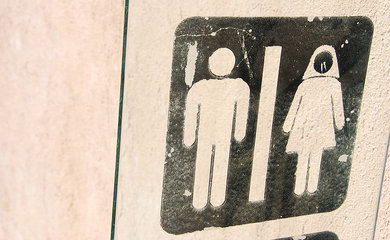I’ve always been a staunch defender of celebs like Anderson Cooper who for most of his career refused to confirm his homosexuality. To me, speculation as to whether Cooper was or wasn’t gay seemed ridiculously tabloid trite in light of the fact that throughout his career, and especially on CNN’s Anderson Cooper 360, the journalist went to great lengths to ensure that LGBT issues and the non-hetero POV was presented in mainstream media. For me, it’s the POV that matters more than the individual broadcasting it.
So when Good Morning America anchor Robin Roberts recently came out without coming out – sidestepping labels in a Facebook post by simply acknowledging her girlfriend as one of many people in her life she’s grateful for – it struck me as yet another giant step for the LGBT community. Indeed, that folks are even presumed to be straight until proven otherwise is such an antiquated notion. When a member of the LGBT community who doesn’t make a big fuss about their identity – “Look, Ma, I’m gay!” – is first assumed to not be part of that community (unless they shout otherwise) in this day and age, it seems, frankly, tiresome. Straight folks don’t have to come out to be included in the heterosexual population, and really, LGBT folks shouldn’t have to draw attention to their identity in order to be included in their respective community either.
Personally, I don’t go around trumpeting that my female form doesn’t match my (gay) male soul. I’m a biological female who identifies as genderqueer – so what? Yet it’s also no secret that I spent years in a relationship with a gay-for-pay escort (and even wrote a memoir about it), living as close to a male homosexual experience as my biology would allow. That defines my POV. So when I’m asked about being a female writer or filmmaker – or female anything – I take that as an opportunity to clarify that I can only speak on my response to society’s treatment of someone it sees as female. (As is expected since I staunchly refuse to alter my outsides to match my insides simply to make myself fit in with the population at large. Or, as my hero(ine) Eddie Izzard says, “I didn’t jump out of a not-wearing-dress box into a have-to-wear-dress box.” As for what women want? Ask Izzard.)
Thus said, I also realize that genderqueers are the bisexuals of the trans world, so I try not to judge trans women or trans men who choose to fully transition. Yet I can’t help but be aware that within the trans community there’s a split that goes beyond gender or sexuality. I’m talking about between those who can pass for the gender they identify with, and those who can’t. And let’s be honest about the former. Like light-skinned blacks who once played white, or gays and lesbians who slipped in with the straights, before minority and gay rights mainstreamed these folks were often seen as traitors to their communities. Their choice to remain silent on identity – thus separating themselves from the “other” – appeared to suggest some sort of shame or embarrassment at being lumped in with a powerless crowd (or less politely, Uncle Toms contributing to the stigmatization of a misunderstood minority community).
Now, of course, it’s shrug-worthy in most enlightened circles to be gay or lesbian. But when it comes to being trans, well, that’s still a touchy identity. (Just ask Cooper’s foot-eating colleague Piers Morgan – or better yet, don’t.) Yet the trans community stands where people of color and homosexuals once stood, at the frontier of not just equal treatment under the law, but total blasé acceptance for who they are in society’s eyes. Which means, of course, we’re still in our Piers Morgan infancy, that we haven’t reached our Robin Roberts moment yet. And, more importantly, that it will come only when a critical mass of us, including those who pass, come out.


One thought on “What’s Gender Got to Do with It? Coming Out Genderqueer”
Comments are closed.